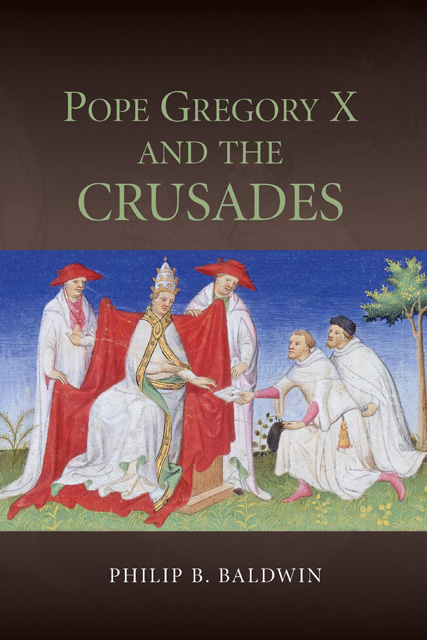Book contents
- Frontmatter
- Dedication
- Contents
- Acknowledgements
- Abbreviations
- Introduction
- 1 The Early Life of Pope Gregory X
- 2 ‘We Saw with Our Eyes and Felt with Our Very Own Hand’: The Importance of Understanding the Condition of the Holy Land
- 3 Interim Crusade Planning
- 4 A Problem of Governance? Pope Gregory X, Charles of Anjou, and the Latin Kingdom of Jerusalem
- 5 Political Exigencies and Gregory’s Crusade
- 6 Imagining Gregory’s Crusade
- Conclusion
- Bibliography
- Index
- Other Volumes in Studies in the History of Medieval Religion
2 - ‘We Saw with Our Eyes and Felt with Our Very Own Hand’: The Importance of Understanding the Condition of the Holy Land
Published online by Cambridge University Press: 28 February 2023
- Frontmatter
- Dedication
- Contents
- Acknowledgements
- Abbreviations
- Introduction
- 1 The Early Life of Pope Gregory X
- 2 ‘We Saw with Our Eyes and Felt with Our Very Own Hand’: The Importance of Understanding the Condition of the Holy Land
- 3 Interim Crusade Planning
- 4 A Problem of Governance? Pope Gregory X, Charles of Anjou, and the Latin Kingdom of Jerusalem
- 5 Political Exigencies and Gregory’s Crusade
- 6 Imagining Gregory’s Crusade
- Conclusion
- Bibliography
- Index
- Other Volumes in Studies in the History of Medieval Religion
Summary
Upon returning to Italy after hearing of his papal election, Gregory immediately set about the task of organising relief for the Holy Land. Whatever the direction of the next crusade, its organisation required that the Franks were well acquainted with the condition of the Holy Land, and of Egypt, so that they could be appropriately prepared. Gregory X and Pope Urban IV stand alone as the only popes to have been to the Holy Land themselves in the time of the Crusades. Urban’s experience as patriarch of Jerusalem had made him, as Jean Richard has pointed out, ‘well informed about the situation in the East.’ Both of these popes, not surprisingly, believed that their personal experience in the Holy Land gave them a special interest in it. This chapter will examine how Gregory used his personal experience in the Holy Land to understand what was needed there, and to encourage crusade participation. He believed that through understanding the desperate situation in the Holy Land, especially from personal experience, people would be more likely to give themselves up once more to the struggle of a new crusade. Thus, Gregory wrote to the English cleric Anthony Bek, who had been on crusade with King Edward: ‘truly, you are one who has observed the needs of that land with your very own eyes: on account of that, you ought to support it.’
Antony Leopold has written that the example of the barons and clergy of the Holy Land sending Theobald of Champagne advice for his crusade ‘seems to be the only record of advice being sent to Europe in this way, and there is no evidence to suggest that crusaders usually took pains to inform themselves of conditions in the East before they left Europe.’ He also noted that ‘most crusaders took counsel when they arrived in the East, an option not available for the papacy.’ This was, in fact, not the case during Gregory X’s time, nor even in the time of Gregory’s near-predecessor, Urban IV. To his credit, Leopold did mention that Gregory and King Philip sent some men ‘to the Holy Land to report on conditions there,’ but he was in fact contradicting his earlier statement.
- Type
- Chapter
- Information
- Pope Gregory X and the Crusades , pp. 40 - 74Publisher: Boydell & BrewerPrint publication year: 2014

